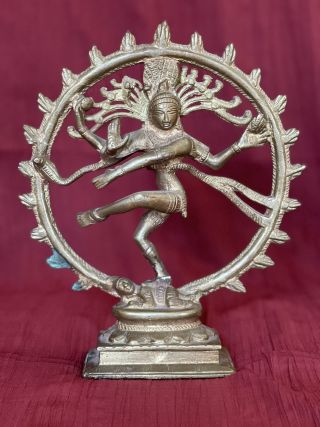Cannabis
Lord Shiva and Cannabis: Destroyer and Creator
Ancient Hindu mythology sheds light on marijuana and the mind.
Posted December 6, 2023 Reviewed by Monica Vilhauer
Key points
- Hindu's Lord Shiva, the Destroyer and Creator, is also a constant cannabis user. Why?
- Cannabis destroys our habitual ways of perceiving both the inner and outer world, challenging reality.
- Both Shiva and cannabis challenge habitual illusions of permanence and challenge us to look deeper.

I first visited India nearly 50 years ago and returned with a statue of Shiva as my prized souvenir. This symbol of constant change as the world transforms through cycles of destruction and creation sat in my office throughout my addiction psychiatry career. With fire in one hand, the drum of creation in another, Shiva gestures for us to remain calm while his dancing crushes mortals’ illusions of permanence. All is in flux.
During a return to India last month, I learned Shiva is intimately associated with cannabis. After drinking a poison that threatened the world, Shiva’s wife gave him cannabis as medicine to counteract the poison. It became his constant companion both as medicine and to help him relax and meditate. Sacred Hindu texts from 1000 BC record the use of a cannabis preparation called bhang by Shiva’s devotees in religious rituals. Today, shops still sell varieties of intoxicating bhang and spice-infused drinks, the oldest known cannabis edible.
My early attraction to Shiva and eventual fascination with the science and meanings of cannabis are a perfect example of synchronicity (i.e., emotionally charged coincidences) popularized by Carl Jung. The connections between Shiva, cannabis, and my professional interest in cannabis’s effects on the brain and experience are just too uncanny to be ignored, or easily explained. Delving into why cannabis came to be connected to Shiva’s role as destroyer, creator, and dispeller of illusion throws some light on all this.
Cannabis affects our brain, and therefore our mind, by toning down our natural endocannabinoid system (see How Marijuana Works). Endocannabinoids regulate the activity of all other brain neurotransmitter systems. The THC in cannabis resembles natural endocannabinoids, but its activity is more powerful and longer lasting. As a result, THC changes the normal balance among the brain’s different neurotransmitters. This alters our conscious experience. Because endocannabinoid receptors are concentrated in specific brain areas, THC especially alters our experience of memory, appetites, time, emotions, and very importantly our sense of novelty and awe. Sights, sounds, and ideas are perceived with an added sense of newness, as though never seen before (jamais vu). Routine stimuli are perceived differently, like how a black light illuminates a poster differently. A rose is just another rose until its unique fragrance and stunning color are attended to and absorbed. Synesthesia, the flowing of perceptions from one sensory system into others, spreads visual and auditory stimuli through the body as thrilling kinesthetic energy. For example, unexpected electronic notes in Pink Floyd’s music can resonate beyond mere sound into bodily sensations.
Habituated perceptions of a rose normally categorize it as a commodity to be picked, photographed, bought, or sold. Under the influence of THC, a rose is related to differently. It may be seen as one member of the plant world, whose photosynthetic power is necessary to feed all animal life on earth. Without flora, there would be no food for fauna. The meaning of a rose is expanded beyond being a commodity or a beautiful image in a photograph. The typical superficial perception of a rose is now understood to be a narrow illusion. Cannabis can give us a variety of ways to relate to the rose, deepening its meaning. This entertaining experience can also be liberating. Once the cannabis experience wears off, people may retain a residue of the realization that the world can be related to in more ways than previously known. Cannabis destroys slavish superficiality as the default way to relate to the world. This understanding can be too disturbing to some, missed by others, and profound for many. Cannabis challenges our habitual modes of perception and relationship.
A few cautions immediately come to mind. Jack London believed his alcohol addiction helped him pierce through the surface of reality. Unfortunately, the realities he saw beneath the surface were profoundly dark and depressing. Perhaps that is in the nature of alcohol’s impact on the brain and the mind. In other words, the “realities” revealed by a drug may not tell us the truth about what lies below the surface.
Secondly, many people mesmerized by the effects of cannabis turn it into something approaching a religion. Alan Watts’ caution about religion is relevant here. Watts wrote that religion is a finger pointing in a spiritual direction, but too many people end up sucking on the finger instead of traveling in the direction it points. In other words, whatever wisdom may be obtained through experience with cannabis needs to be brought into the sober world and used to guide daily life, not simply repeatedly revisited when stoned.
Finally, there are many ways other than cannabis to learn how to deepen perceptions of the world, and not everyone is able to integrate the sudden challenge offered by cannabis. Those with mental illness may be negatively destabilized. The very young may not have a strong enough psychological foundation to absorb the impact of cannabis’s challenge to normally perceived reality. The result may be a weakening of fundamental cognitive processes to the detriment of further maturation. You have to know the rules before being able to break them creatively.
I understand now what attracted me to both Shiva and studying cannabis. We would be well advised not to fear challenging our habitual perceptions and thoughts. The world, including ourselves, is in constant flux, constant re-formation through destruction and re-creation. All learning is a process of unlearning and relearning, forgetting and gathering new experience. Shiva symbolizes this constant flux, but Hindu stories are myths and must be counterbalanced by reason. Like Shiva, cannabis can provide an experience that challenges our habitual relationship to the world. In the end, however, excessive use and addiction are never good for the brain, the mind, or relationships (see How Marijuana Works).


